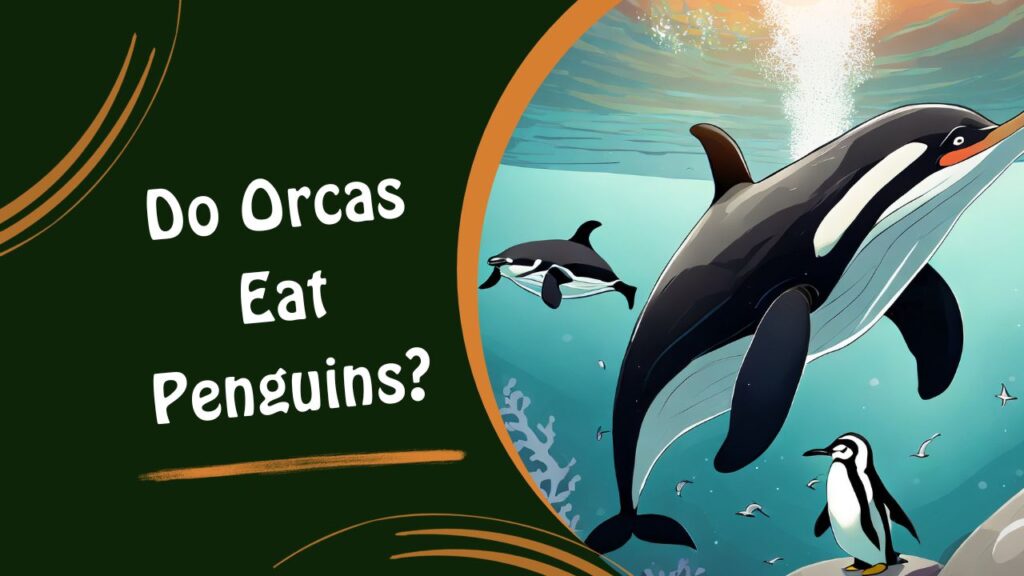Last updated on January 25th, 2024 at 02:54 pm

Do Orcas Eat Penguins? Yes, orcas do eat penguins. Orcas are known to prey on penguins as part of their diet in the wild.
Orcas often feed on penguins, particularly in the southern hemisphere where they coexist. Being expert hunters, orcas use their quickness and cunning to subdue penguins in the water.
Orcas are strong predators in their natural environment and are essential to preserving the harmony of aquatic ecosystems.
The dynamic relationships between various species are highlighted by the contact between orcas and penguins, which illustrates the intricate food web in the ocean.
We can better appreciate orcas’ ecological significance and the mutual dependence on marine life if we are aware of their eating patterns.
Let’s investigate the intriguing link that exists between orcas and penguins as well as the importance of this predator-prey dynamic in the marine ecosystem.
Table of Contents
The Predatory Nature Of Orcas
Orcas’ hunting habits: Killer whales, sometimes referred to as orcas, are top predators that eat a wide variety of foods, including fish, seals, and even other whales1.
They frequently cooperate in synchronized attempts to capture their prey, demonstrating how sophisticated their hunting methods are.
Orcas exhibit a great degree of intellect and planning when hunting, employing techniques like stunning their victims with their tails.
This demonstrates their advanced cognitive skills, which allow them to precisely find and catch their victim. [Do Orcas Eat Penguins?]
See Also: Do Dolphins Attack Orcas? The Truth Revealed
Penguins In The Orcas’ Diet
Geographic distribution of penguins: Penguins can be found across the Southern Hemisphere, with certain species living in Antarctica and the Galápagos Islands2. Examples of these species are the Emperor and Galápagos Penguins.
Predation events: There have been reports of orcas and penguins being preyed upon in regions like the waters surrounding Antarctica and the southern shores of South America.
Particular species targeted: The Gentoo and Adélie penguins, which are common in the orcas’ habitat zone, are the main targets of orca predation on penguins.
Impact On Penguin Populations
It is well known that orcas eat a wide variety of foods, including fish, seabirds, and marine animals. It’s crucial to remember, though, that penguins are not an ordinary piece of prey for orcas.
Although there have been reports of orcas hunting penguins, these incidents are rather uncommon and have little effect on penguin numbers as a whole.
Rather of concentrating on orca predation, conservation initiatives for penguin populations frequently address other environmental challenges and the preservation of their habitats.
To keep the balance of marine life, it is essential to keep an eye on the dynamics of the ecosystem and take species interdependence into consideration. [Do Orcas Eat Penguins?]
See Also: Can Orcas And Dolphins Mate? The Unbelievable Love Story
Frequently Asked Questions On Do Orcas Eat Penguins?
What Do Orcas Eat In The Wild?
Fish, squid, and other marine mammals like seals and sea lions are the main foods that orcas eat in the wild. As opportunistic hunters, they have been observed consuming a wide range of species, contingent on their habitat and the accessibility of food supplies.
Do Orcas Hunt Penguins?
No, orcas don’t usually hunt penguins because they live in separate places. Orcas can be found in a variety of marine environments worldwide, such as the Arctic, Atlantic, and Pacific oceans, while penguins are primarily located in the Southern Hemisphere, surrounding Antarctica.
Why Are Orcas Sometimes Called Killer Whales?
The name “whale killer,” which was traditionally used by sailors and whalers who saw orcas pursuing and preying on larger whale species, is really where the phrase “killer whale” originates. Orcas are the largest members of the dolphin family, yet they are not considered whales.
Conclusion
Although a vast range of prey, including fish and marine animals, are known to be consumed by orcas, there is no proof that they actively pursue penguins.
While penguins are mainly found in the southern hemisphere, these oceanic giants are mainly found in frigid arctic regions.
As a result, there is very little probability that these two species will ever come into contact in the wild.

Mr. Das, a certified pharmaceutical scientist, holds a Bachelor of Science in Pharmaceutical Sciences and passionately contributes to dolphin conservation as a member of the committee in Bangladesh.


